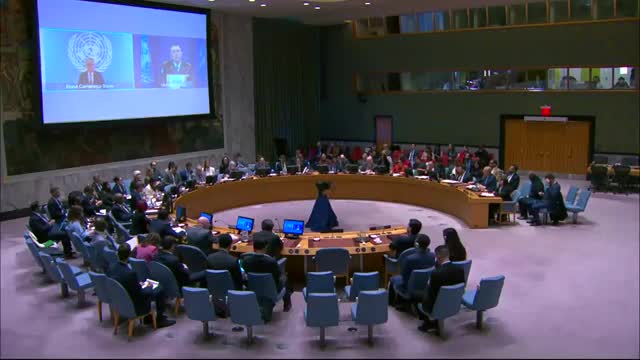UN official says UNIFIL supporting Lebanese troop deployments as challenges to freedom of movement persist
Get AI-powered insights, summaries, and transcripts
Subscribe
Summary
A United Nations briefing to the Security Council said the cessation of hostilities between Lebanon and Israel remains fragile but holding, highlighted expanded Lebanese Armed Forces deployments south of the Litani River and reported UNIFIL discoveries of weapons caches while warning that Israeli forces remain present in Lebanese territory.
Jean-Pierre Lacroix, a United Nations official, told the Security Council that the cessation of hostilities between Lebanon and Israel remains fragile but continues to hold and that the United Nations Interim Force in Lebanon (UNIFIL) has stepped up support for Lebanese Armed Forces deployments south of the Litani River.
Lacroix said Lebanese authorities have committed to upholding their obligations under Security Council resolution 1701 and that, as of Jan. 15, the Lebanese Armed Forces (LAF) had deployed to 93 locations south of the Litani River compared with an estimated 10 locations on Nov. 27. "UNIFIL has supported the Lebanese army in its deployment to many of these locations," Lacroix said.
Why it matters: the implementation of resolution 1701 and the parties' respect for the cessation of hostilities are central to security and the return of residents to communities near the Blue Line. Lacroix emphasized both operational and political steps the mission and the parties must take for stability to be sustained.
Details from the briefing included UNIFIL reporting that it had located 116 caches of weapons and ammunition, including rocket-propelled grenade launchers, rockets, anti-tank mines and rifles, and that it had observed potential tunnel and sites associated with Hezbollah. UNIFIL said it has informed the Lebanese Armed Forces in each instance for appropriate action. The mission reported detecting trajectories of projectiles fired from south to north of the Blue Line at a much lower level than before Nov. 27, and it recorded three trajectories from north to south of the Blue Line since Nov. 27, with none reported since Dec. 2.
Lacroix described recent LAF recruitment and deployment activity: 262 newly recruited personnel have been deployed to the southern Litani sector; 673 recruits are undergoing training; and roughly 600 individuals are undergoing pre-recruitment screening. The briefing also referred to "a plan to deploy an additional 6,000 troops," as presented to the cessation-of-hostilities mechanism, though the transcript did not specify the origin or detailed mechanics of that plan.
UNIFIL said it is adjusting its posture and operational activities to support the cessation of hostilities in line with resolution 1701, and is increasing capabilities in mine clearance, unexploded ordnance disposal and engineering to clear roads and restore patrolling and monitoring. The mission reported it is now conducting an average of about 50 operational activities and 28 logistical activities per day compared with about 16 total activities per day before Nov. 27.
Lacroix warned that constraints on UNIFIL's freedom of movement remain a significant obstacle. He cited unexploded ordnance, Israeli Defense Forces (IDF) roadblocks, interference from local individuals and instances when contingents were confined to base or required to take shelter due to nearby IDF activity. He said a notable example occurred on Jan. 6 when UNIFIL personnel at Naqoura headquarters took shelter for roughly three hours while the IDF conducted demolitions nearby; the IDF began withdrawing later that afternoon, coinciding with the meeting of the cessation-of-hostilities mechanism.
"Noting that the Israel Defense Forces has stated that its actions are targeting Hezbollah assets and personnel, the continued presence of the Israel Defense Forces in Lebanon is a violation of resolution 1701. We urge the Israel Defense Forces to withdraw from Lebanese territory," Lacroix said.
The briefing said UNIFIL is also expanding use of technology to enhance monitoring along the Blue Line, and that the mission is refining public messaging to address misinformation about its mandate. Lacroix noted UNIFIL is sharing violation-related information with a mechanism chaired by the United States with participation from France — subject to the consent of the parties — and urged the parties to use the forum to resolve outstanding issues through coordination rather than unilateral action.
Lacroix said the United Nations Secretary-General visited Lebanon during the period and that the secretary-general will underscore the message of Lebanese authorities' obligations under the cessation of hostilities and resolution 1701 in upcoming meetings with Lebanon's newly elected president, speaker of parliament and designated prime minister. He also called for renewed international support for deploying and sustaining strengthened LAF capacities and for troop-contributing member states to continue their contributions to UNIFIL and the United Nations Truce Supervision Organization (UNTSO) observer arrangements.
The briefing closed with a brief reference to the United Nations Disengagement Observer Force (UNDOF): Gerard Gaucher was identified as serving temporarily as acting head of mission and force commander of UNDOF until the scheduled deployment of Major General Anita Hassma in February. No formal Security Council decisions were recorded during the briefing.
The Security Council received the briefing; the secretary-general and senior UN officials planned further meetings in Beirut to press for implementation steps and to coordinate support for LAF deployment and UNIFIL operations.
